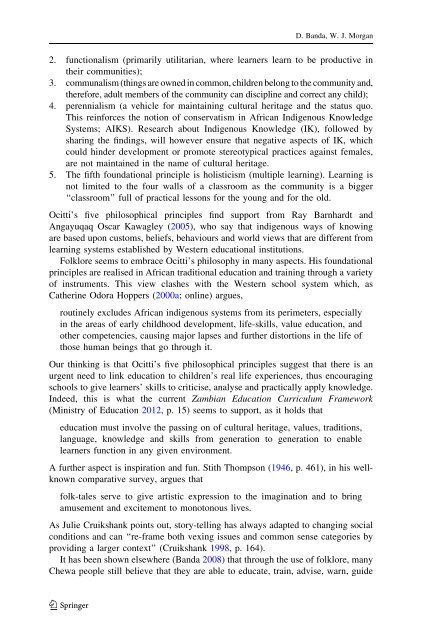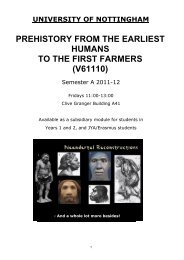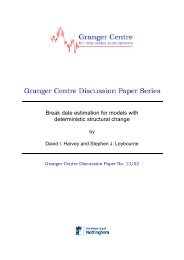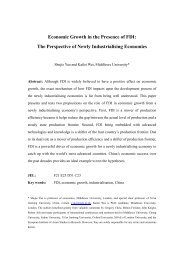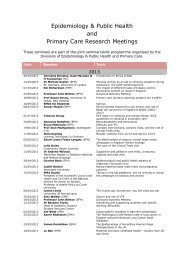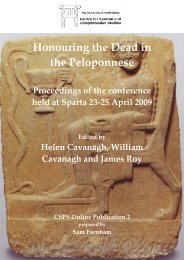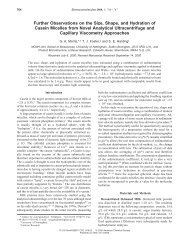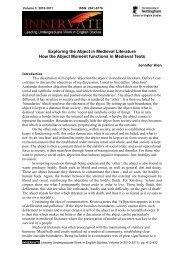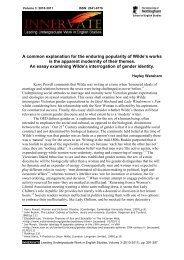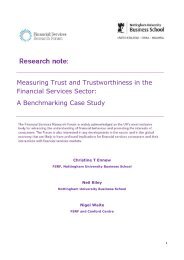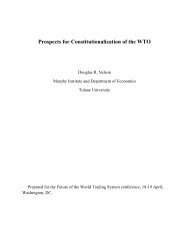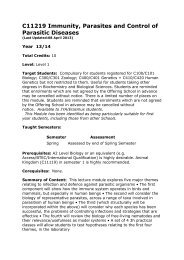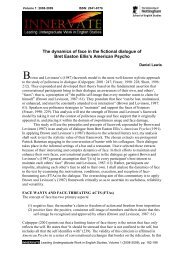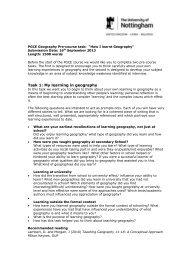Folklore as an instrument of education among the Chewa people of ...
Folklore as an instrument of education among the Chewa people of ...
Folklore as an instrument of education among the Chewa people of ...
Create successful ePaper yourself
Turn your PDF publications into a flip-book with our unique Google optimized e-Paper software.
D. B<strong>an</strong>da, W. J. Morg<strong>an</strong><br />
2. functionalism (primarily utilitari<strong>an</strong>, where learners learn to be productive in<br />
<strong>the</strong>ir communities);<br />
3. communalism (things are owned in common, children belong to <strong>the</strong> community <strong>an</strong>d,<br />
<strong>the</strong>refore, adult members <strong>of</strong> <strong>the</strong> community c<strong>an</strong> discipline <strong>an</strong>d correct <strong>an</strong>y child);<br />
4. perennialism (a vehicle for maintaining cultural heritage <strong>an</strong>d <strong>the</strong> status quo.<br />
This reinforces <strong>the</strong> notion <strong>of</strong> conservatism in Afric<strong>an</strong> Indigenous Knowledge<br />
Systems; AIKS). Research about Indigenous Knowledge (IK), followed by<br />
sharing <strong>the</strong> findings, will however ensure that negative <strong>as</strong>pects <strong>of</strong> IK, which<br />
could hinder development or promote stereotypical practices against females,<br />
are not maintained in <strong>the</strong> name <strong>of</strong> cultural heritage.<br />
5. The fifth foundational principle is holisticism (multiple learning). Learning is<br />
not limited to <strong>the</strong> four walls <strong>of</strong> a cl<strong>as</strong>sroom <strong>as</strong> <strong>the</strong> community is a bigger<br />
‘‘cl<strong>as</strong>sroom’’ full <strong>of</strong> practical lessons for <strong>the</strong> young <strong>an</strong>d for <strong>the</strong> old.<br />
Ocitti’s five philosophical principles find support from Ray Barnhardt <strong>an</strong>d<br />
Angayuqaq Oscar Kawagley (2005), who say that indigenous ways <strong>of</strong> knowing<br />
are b<strong>as</strong>ed upon customs, beliefs, behaviours <strong>an</strong>d world views that are different from<br />
learning systems established by Western <strong>education</strong>al institutions.<br />
<strong>Folklore</strong> seems to embrace Ocitti’s philosophy in m<strong>an</strong>y <strong>as</strong>pects. His foundational<br />
principles are realised in Afric<strong>an</strong> traditional <strong>education</strong> <strong>an</strong>d training through a variety<br />
<strong>of</strong> <strong>instrument</strong>s. This view cl<strong>as</strong>hes with <strong>the</strong> Western school system which, <strong>as</strong><br />
Ca<strong>the</strong>rine Odora Hoppers (2000a; online) argues,<br />
routinely excludes Afric<strong>an</strong> indigenous systems from its perimeters, especially<br />
in <strong>the</strong> are<strong>as</strong> <strong>of</strong> early childhood development, life-skills, value <strong>education</strong>, <strong>an</strong>d<br />
o<strong>the</strong>r competencies, causing major lapses <strong>an</strong>d fur<strong>the</strong>r distortions in <strong>the</strong> life <strong>of</strong><br />
those hum<strong>an</strong> beings that go through it.<br />
Our thinking is that Ocitti’s five philosophical principles suggest that <strong>the</strong>re is <strong>an</strong><br />
urgent need to link <strong>education</strong> to children’s real life experiences, thus encouraging<br />
schools to give learners’ skills to criticise, <strong>an</strong>alyse <strong>an</strong>d practically apply knowledge.<br />
Indeed, this is what <strong>the</strong> current Zambi<strong>an</strong> Education Curriculum Framework<br />
(Ministry <strong>of</strong> Education 2012, p. 15) seems to support, <strong>as</strong> it holds that<br />
<strong>education</strong> must involve <strong>the</strong> p<strong>as</strong>sing on <strong>of</strong> cultural heritage, values, traditions,<br />
l<strong>an</strong>guage, knowledge <strong>an</strong>d skills from generation to generation to enable<br />
learners function in <strong>an</strong>y given environment.<br />
A fur<strong>the</strong>r <strong>as</strong>pect is inspiration <strong>an</strong>d fun. Stith Thompson (1946, p. 461), in his wellknown<br />
comparative survey, argues that<br />
folk-tales serve to give artistic expression to <strong>the</strong> imagination <strong>an</strong>d to bring<br />
amusement <strong>an</strong>d excitement to monotonous lives.<br />
As Julie Cruiksh<strong>an</strong>k points out, story-telling h<strong>as</strong> always adapted to ch<strong>an</strong>ging social<br />
conditions <strong>an</strong>d c<strong>an</strong> ‘‘re-frame both vexing issues <strong>an</strong>d common sense categories by<br />
providing a larger context’’ (Cruiksh<strong>an</strong>k 1998, p. 164).<br />
It h<strong>as</strong> been shown elsewhere (B<strong>an</strong>da 2008) that through <strong>the</strong> use <strong>of</strong> folklore, m<strong>an</strong>y<br />
<strong>Chewa</strong> <strong>people</strong> still believe that <strong>the</strong>y are able to educate, train, advise, warn, guide<br />
123


